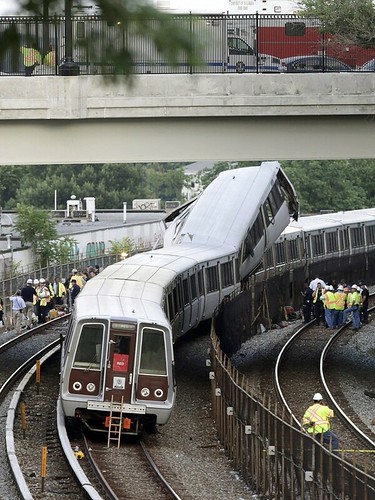The WMATA Board did fail and needs to take responsibility for it

People work at the scene where two transit trains were involved in a crash in Washington June 22, 2009. Two Washington, D.C., subway trains collided during the Monday afternoon rush hour, killing four people and injuring 70 in a mass of tangled metal. REUTERS/Yuri Gripas (UNITED STATES TRANSPORT SOCIETY)
WRT the crash in June 2009 that killed 9 people ("THE PROBE: Experts Suspect Failure Of Signal System, Operator Error" from the Post) and that the National Transportation Safety Board released a report and held hearings ("Red Line crash was inevitable, NTSB finds : 'Only question was when' Board blames circuit failures negligent safety attitude" from the Post), and the NTSB's subsequent meeting with the WMATA Board.
The Examiner reports on the meeting, according to the article, "Graham: Metro board could do nothing to prevent deadly crash." DC City Councilman Jim Graham, the Chairman of the Board when the accident occurred, says it wasn't the board's fault. From the article:
The Metro Board of Directors could not have done anything differently given the information it had at the time of the June 2009 Red Line crash that killed nine people and injured dozens of others, said board member Jim Graham, chairman at the time of the incident.
Wow.
I guess the board didn't have the right information. (The same kind of problem President George Bush had with regard to Al-Qaeda before September 2001.)
Error #1
There is a significant problem with Chairman Graham's assertion as there were internally reported near miss accidents in 2005 and in 2009 that could have resulted in extensive loss of life:
- in Rosslyn in 2005, see "Metro operator: Recent crash failure echoes 2005 near-miss" from the Examiner
- I seem to recall reports after the crash of a near miss incident on the blue/orange line in the vicinity of Eastern Market, earlier in 2009, but now I can't find the article
but did not result in a crash, injury, or death, because of emergency response action by operators.
But the root cause of the incidents were not determined, instead the incidents were considered crazy exceptions, and monitoring systems were not changed.
The fact was, these incidents were indicators of serious and significant system faults.
Besides the recent discussion in GGW ("Metro needs calm, proactive hazard analysis") about systems and safety, there is a lot of discussion in "the business world" about dashboard systems for monitoring key business metrics.
At the MWCOG-BOT hearing about Metro governance, a city councilman from Falls Church mentioned the development and deployment of enterprise risk management systems. (And back in college I used to read the board of regents packages, which included an extensive section about key risks, mostly pending lawsuits back then.)
I am not sure what the absolute metrics for WMATA should be, or what type of reports the board receives each month, but key metrics should include safety--including detailed information about accidents, including near misses, as well as injuries, and deaths--and on-time performance.
With regard to safety, there should be detailed reports about accidents in general, with special attention on catastrophic or near-catastrophic events, with significant discussion and explanation of status and the ability to resolve the problem. In short, a kind of WMATA specific Risks Digest comparable to the multi-decade running Forum On Risks To The Public In Computers And Related Systems.
The fact that significant accidents were avoided before the fatal accidents should have been important enough to motivate the board to change the system.
Failure is supposed to be built out of the system by the system.
I can't think of a much greater dereliction of duty and responsibility (other than the same failure by people in the Rail Operations and Safety Departments).
Error #2
The second WMATA board of directors error of major proportions was the hiring process which culminated in the hiring of John Catoe as General Manager. I am not knocking, necessarily, his being picked.
But Mr. Catoe was hired because of his vast experience and track record in improving bus systems--a record of continued and ever increasing accomplishment. And he was hired because the board of directors took for granted that the operation of the rail system was fine as it was and didn't need to be overseen by a general manager with deep experience with rail operations.
Both Mr. Catoe and the board may have lacked the right skill set to direct the proper amount of focus and attention to the real and fundamental problems in the rail operations division concerning safety.
Error #3
If making changes because of serious significant errors isn't the board's responsibility, I don't know what their responsibility is and how to measure accountability.
There have been many articles post BP oil spill in the Gulf of Mexico about the difference between BP after many safety accidents resulting in significant loss of life, vs. what ExxonMobil did after the Exxon Valdez oil spill in Alaska, and how the company significantly changed its procedures, process and culture in order to make safety a foremost priority, that as importantly, was built into operational systems as "standard operating procedure."
While I am sure that Exxon isn't perfect and safety problems occur, it can't be denied that their business operations don't appear to have the same types of systemic problems exhibited by BP.
WMATA also must rebuild its systems and operational procedures to prioritize safety and to not take the quality operation of the subway system for granted.
That is clearly their responsibility, no matter what Councilmember Graham says.
This means that I have to disagree with GGW on this entry: WMATA Board not at fault for crash, but needs to step up.
Taking responsibility is the necessary first step for systems change.
Labels: change-innovation-transformation, government oversight, provision of public services, public safety, transit



0 Comments:
Post a Comment
<< Home